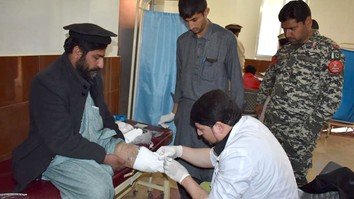PESHAWAR -- Rahim Gul, 25, a resident of Bajaur Agency, lost his both legs to a land mine planted by militants two years ago.
"I am waiting for a free wheelchair made to my size," he told Pakistan Forward at the Paraplegic Centre in Peshawar, where he went to have his body measured for a customised wheelchair.
"The wheelchair I am using now is basic," he said. "Now they are making more advanced wheelchairs for us."
Custom wheelchairs
The Paraplegic Centre in Peshawar has started manufacturing customised wheelchairs to enhance the mobility of the disabled.
"We have started production to assist people who lost their legs and arms in militancy-stricken areas and who had been confined to their homes," Parapalegic Centre Chief Executive Officer Syed Muhammad Ilyas told Pakistan Forward.
Others who have suffered disabilities due to falls, traffic accidents and gunshot wounds will benefit from the programme too, he said.
Those who received treatment at the centre for paralysis will obtain wheelchairs, he said. The first priority goes to survivors of terrorism and those who are recovering from spinal injuries.
"We are manufacturing the wheelchairs for the first time in Pakistan," he said, adding that they are more advanced than the basic wheelchairs that Pakistanis have been using up to now. They are made to specification, as well, unlike most wheelchairs in Pakistan.
"Currently, children and adults use the same-sized wheelchairs, which brings them discomfort," he said. "Under the programme, they will get wheelchairs in which they can sit and travel easily."
"Our experts have carried out research on how to help people with disabilities," he said. "Assisting their free movement is our main objective."
Expanding production
The centre, which started making wheelchairs in 1984, has been manufacturing about 400 wheelchairs per year, providing 8,500 free wheelchairs to patients since its establishment and selling the others to recipients who can pay.
The International Committee of the Red Cross (ICRC) is helping the centre's technicians upgrade their wheelchair-manufacturing skills, Ilyas said.
In addition, the centre is collaborating with the International Society of Wheelchair Professionals to provide a free wheelchair to every needy person. The ICRC is funding that one-year programme, as officials decide whether to keep the programme going.
"We have installed new equipment at the workshop," he said. "This year, we will make 1,000 wheelchairs, which will be increased to 2,000 and 3,000 in the second and third years, respectively."
Residents of the Federally Administered Tribal Areas (FATA), Malakand Division and Afghanistan are coming to the Paraplegic Centre for treatment and wheelchairs, he said.
As production increases, he said, the centre plans to supply the wheelchairs to the commercial market.
The centre's manufacturing model can be replicated anywhere in the country, said Mansoor Golra, a project officer at the centre.
"The innovative approach is meant to manufacture wheelchairs for government and private organisations in the future," he told Pakistan Forward, adding that in the next phase, the centre will start manufacturing crutches to help the disabled walk.
Of the 300,000 disabled residents of Khyber Pakhtunkhwa (KP), 1 in 10 uses a basic wheelchair, Golra said. Most such wheelchairs are imported.
The centre has invited professional technicians from Muzaffarabad and Afghanistan to develop technicians' skills and to train them on the use of local materials and technology in manufacturing low-cost, adjustable wheelchairs, he said.
'New life' for the disabled
The centre has conducted research on the diverse needs of wheelchair users, taking into account each user's age, size and injury, Golra said.
"The programme aims to provide different wheelchairs to people with different disabilities and enable them to carry out their routine work," he said.
The customised wheelchairs with their advanced design "give new lives to the disabled", he said.
Everyone who receives a free wheelchair from the Paraplegic Centre will also receive free repair service at the centre's workshop, which has spare parts on hand, he said.
Jabeen Khan, who received treatment a the centre for injuries in a bombing in Bajaur Agency two years ago, is the beneficiary of a new wheelchair.
Khan said he was overjoyed to receive a new wheelchair, adding that it has made his life more comfortable and that he is now able to access a nearby mosque and markets.
The new wheelchairs "facilitate free movement", he told Pakistan Forward. "Using high technology, they are designed to give relief to their users."
Blow to militancy
The programme is giving a boost of confidence to residents of militancy-hit areas, especially those with disabilities, said Khadim Hussain, a Peshawar-based security analyst and author.
"The wheelchairs enable the handicapped to visit different places and continue their social activities," he told Pakistan Forward.
Giving survivors of grievous injuries the chance to live more-normal lives inflicts a blow to militants' destructive plans, he said.

![Technicians January 10 in Peshawar build customised wheelchairs to help disabled survivors of terrorism. [Ashfaq Yusufzai]](/cnmi_pf/images/2017/01/18/7064-11-585_329.jpg)






